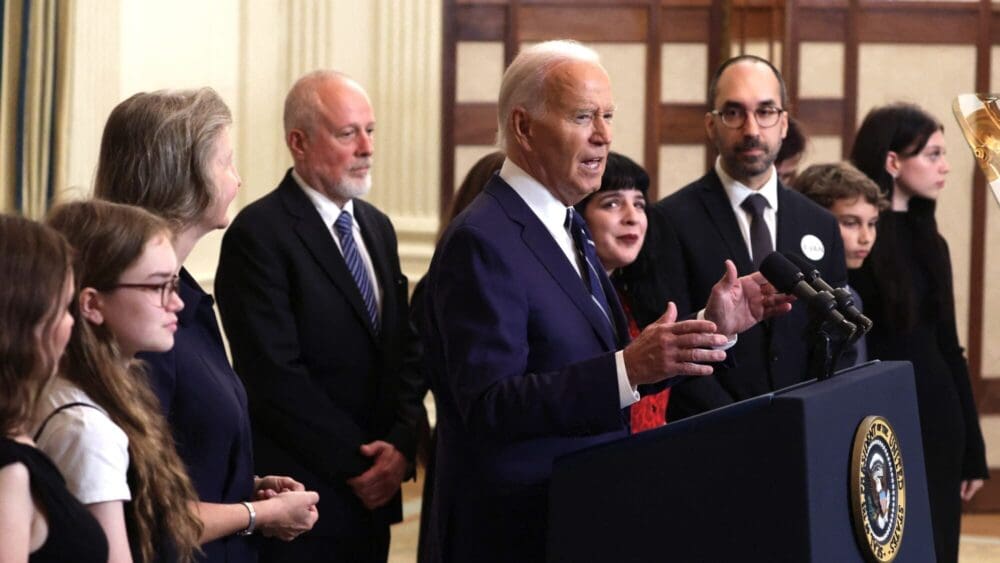
President Biden announcing the deal in the White House, standing among families of the returned prisoners.
Alex Wong / AFP
An infamous assassin who shot a man in Berlin in broad daylight has been freed and sent back to Russia in the largest prisoner exchange since the Cold War.
A total of 16 people were freed from Russian prisons in the deal, including the Wall Street Journal reporter Evan Gershkovich, as well as a handful of dissident politicians and activists opposed to the war in Ukraine. The eight Russians who were handed back to Moscow are mostly spies busted in the West, including Vadim Krasikov, the infamous ‘bicycle assassin.’
Gershkovich was the first journalist working for an American outlet to be arrested on (false) espionage charges in Russia since the end of the Cold War. He was detained in March last year. After fifteen months in detention, he was sentenced to 16 years in a penal colony after a three-day show trial for allegedly collecting information about Russian military equipment on behalf of the CIA. Moscow claimed to have “irrefutable” proof of Gershkovich’s guilt but failed to present any evidence whatsoever.
As a final act before his release, Gershkovich was made to fill out a form requesting an official presidential pardon. According to the WSJ, the reporter added one last line to the form, addressing President Putin directly to request an interview.
Along with the reporter, the prisoner swap freed two other U.S. citizens: Paul Whelan, a former U.S. marine also convicted of espionage after his 2018 detention, and Alsu Khurmaseva, a Russian-American journalist sentenced to six years for breaking Russia’s draconian censorship laws.
The 16 also include a Russian-British opposition politician, two anti-Kremlin activists (one of them was arrested in 2022 for replacing price stickers in supermarkets with anti-war messages), and five German nationals, including Rico Krieger, a paramedic who had been sentenced to death in Belarus for allegedly plotting a terror attack against the regime in October 2023.
The Westerners, especially Gershkovich and Krieger, were generally believed from the very beginning to have been arrested by Moscow on false pretenses with the specific aim to be later used as bargaining chips in prisoner exchanges. Both Washington and Berlin speculated that the Kremlin’s primary target was Krasikov, the ‘bicycle assassin’ detained in Berlin back in 2019.
As an undercover FSB operative, Krasikov shot and killed a Georgian citizen of ethnic Chechen background in a Berlin park in broad daylight while cycling past him, hence the nickname. He was sentenced to life in prison in 2021.
Moscow, however, denied Krasikov acting as an intelligence agent, branding the hitman a “patriot” who simply acted out of love for his country when he eliminated the former militia leader who had been placed on a terror list for his role in the Second Chechen War.
During his press conference on Thursday, President Biden praised German Chancellor Olaf Scholz for the “tough call” of agreeing to the release of Krasikov. According to the president, Scholz told Biden: “For you, I will do this.” Scholz said the decision was made “balancing the interest of the state in enforcing the sentence with the freedom and the risks to the health and, in some cases, to the lives of innocent people detained in Russia.” Along with Krasikov, Russia received two men convicted for cybercrimes in the United States, an alleged FSB agent accused of shipping U.S. military tech to Russian contacts, and four further spies caught in Norway, Poland, and Slovenia.
For their cooperation, Biden thanked these countries for making the “bold and brave” decision to help bring the American and German prisoners home.
“Some of these women and men have been unjustly held for years. All have endured unimaginable suffering and uncertainty. Today, their agony is over,” Biden said at the White House presser.
For his part, former president Donald Trump strongly criticized the swap. The Republican nominee questioned whether Biden made a “good deal” by handing over serious criminals and whether Washington also paid large sums of “cash” to see the deal resolved.
